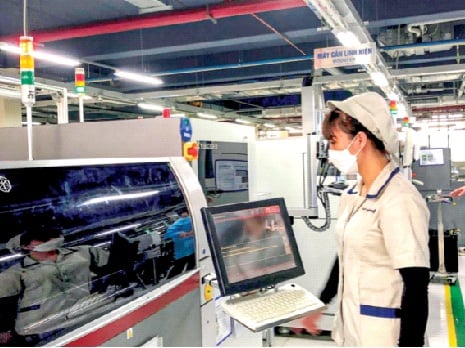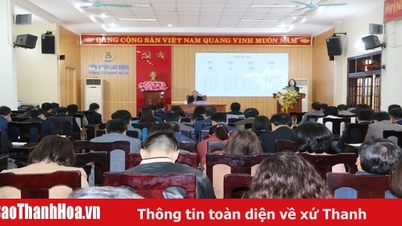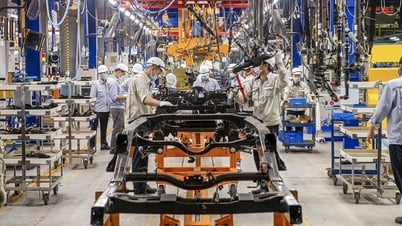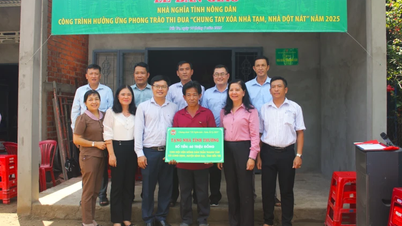On the eve of the 54th Annual Meeting of the World Economic Forum (WEF Davos 2024), Prime Minister Pham Minh Chinh said that after nearly 40 years of renovation, Vietnam has successfully transformed from a planned, subsidized economy to a market economy; transformed from an underdeveloped country to a developing country; the size of the economy has reached 435 billion USD, entering the top 40 leading economies in the world. Currently, Vietnam is mobilizing all resources to serve the country's rapid and sustainable development, based on science, technology, innovation; striving to become a developing country with modern industry and high average income by 2030; and to become a developed, high-income country by 2045.
| Science - technology and human resources will be the driving force for the economy to grow rapidly. |
An attractive market
This goal is completely feasible when Vietnam is gradually becoming an attractive market for domestic and international technology enterprises. Mr. Ryan McInerney, CEO of Visa - the world's leading digital payment corporation in the US, said that Visa always considers Vietnam as one of the most important markets in the world. Because this is a very dynamically developing market, with many new features, especially in the fields of science and technology, innovation and electronic payment methods. Although operating in Vietnam for more than 20 years, the enterprise still wants to continue to participate more deeply in the picture of innovation and digital transformation in Vietnam.
 |
| Global technology corporations are investing heavily into the technology manufacturing sector in Vietnam |
Statistics from the Ministry of Planning and Investment also show that Vietnam has taken steps to welcome new investment flows in the high-tech sector from large corporations in the world such as Intel, Samsung, etc. For Samsung alone, the number of Vietnamese tier 1 and tier 2 suppliers in the global supply chain of this corporation has increased 10 times, from 25 enterprises in 2014 to 257 enterprises by the end of 2022. The fact that global technology corporations are investing heavily in the technology manufacturing sector in Vietnam has caused the domestic market to expand rapidly.
Mr. Nguyen Van Khoa, Chairman of the Vietnam Software and Information Technology Services Association (VINASA), said that Vietnam's digital technology enterprises have impressive growth rates. In the export service market, MOR Software and Savvycom have grown 2 times; CMC Global has grown 70%. The domestic market has also recorded impressive growth figures such as: One Mount increased by 80%; ITSOL increased by 90%; Viettel Cyber Security, FPT Smart Cloud increased by 100%... In particular, there are enterprises that have grown up to 2,800%. Many Vietnamese technology enterprises are present in over 20 countries, have tens of thousands of employees, and carry out digital transformation for enterprises in the Fortune 500 list and the world's leading corporations.
Vietnam's digital technology industry has made encouraging progress. The number of digital technology enterprises increased by 30%, revenue increased by 32%. Notably, the proportion of "made in Vietnam" increased from 21% to 29%. In particular, the field of software production for foreign countries increased by 43%. Currently, Vietnam has over 1,500 digital technology enterprises with revenue approaching the 10 billion USD mark, Minister of Information and Communications Nguyen Manh Hung informed.
Building consistent and transparent policies
However, to reap the "sweet fruit", many technology enterprises are facing many difficulties when investing. According to an expert, in addition to large investment costs over a long period of time, Vietnam's investment environment is sometimes not capable of absorbing high-tech projects. In particular, the application of a global minimum tax rate will have a significant impact on attracting foreign investment and high-tech and source technology enterprises.
Therefore, this expert suggested that Vietnam must improve and upgrade other tax factors in the investment environment. In particular, it is necessary to develop human resources, supporting industries and have transparent and synchronous policies with developed countries. In addition, it is necessary to change the mindset of vocational training towards providing what society needs; including increasing the proportion of engineers, the proportion of mid-level and high-level technical staff, and skilled workers.
Sharing this view, representatives of a number of foreign technology enterprises also hope that the Vietnamese Government will continue to create conditions for continued cooperation with Vietnamese enterprises to invest in development in the fields of technology, innovation, semiconductors, artificial intelligence, strategic infrastructure, etc.; create an increasingly favorable investment environment to attract investment, including improving policy mechanisms, infrastructure, human resources, etc. so that investors in this field can operate better and better.
To facilitate technology investment, the Politburo has recently issued Conclusion No. 69-KL/TW on developing science and technology to serve the cause of industrialization and modernization in the context of a socialist-oriented market economy and international integration. This is considered a great driving force for science - technology and innovation to truly play the role of a leading national policy, a strategic breakthrough, and an important driving force for renewing the growth model, developing the country quickly and sustainably in the coming time.
Source link


![[Photo] Prime Minister Pham Minh Chinh and Prime Minister of the Kingdom of Thailand Paetongtarn Shinawatra attend the Vietnam-Thailand Business Forum 2025](https://vphoto.vietnam.vn/thumb/1200x675/vietnam/resource/IMAGE/2025/5/16/1cdfce54d25c48a68ae6fb9204f2171a)



































![[Photo] President Luong Cuong receives Prime Minister of the Kingdom of Thailand Paetongtarn Shinawatra](https://vphoto.vietnam.vn/thumb/1200x675/vietnam/resource/IMAGE/2025/5/16/52c73b27198a4e12bd6a903d1c218846)


























































Comment (0)